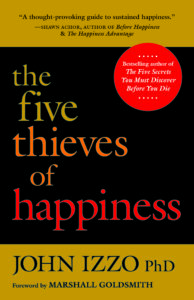Be Happier This Year
What if happiness was your natural state?
What if we are seeking something on the outside that is found on the inside?
How do you recognize and lock out the five thieves that want to steal your happiness?
That’s what John Izzo teaches. He believes that happiness is being stolen by mental patterns. Five thieves are working to destroy your happiness.
All of us can recognize these thieves and learn to lock them out of our lives.
John Izzo, PhD, is a speaker and author of six books. I read his latest, The Five Thieves of Happiness and enjoyed its thoughtful approach. I recently asked him about his latest work.
The Science of Happiness
Why is the study of happiness and the pursuit of happiness such a rage today?
Well, I think some of the things that used to make us happy such as a sense of community and connection have been lost. So, a loss of place and being more urban is now a contributor. Also, a rising middle class focuses more on happiness. They say there is also something bigger when things in the larger society seem out of control—things like climate change, terrorism, the pace of change. We realize we cannot control these things so we often focus in where we can change—which, by the way, is a good instinct because it is where all societal change begins anyway. Finally, I think the fact that science has started to study happiness in a serious way helps because maybe people feel that you can actually hardwire happiness rather than thinking that some people are simply happy.
“Attention without attachment” immediately pulled me in. How do we best make this a daily practice?
It is a critical concept for happiness. Attention is about the actions we take, the intention we have moment to moment. Attachment is a focus on a goal or what is called in yoga a “sticky desire.” Here is a simple example: I play a great deal of tennis. Attention is about being in the present moment at every point in a match. Being aware of my body, how I want to hit the ball and seeing what is happening around me. There is great happiness in playing and even the artistry of the moment-to-moment intention to improve. Winning the match is attachment and is something I cannot control. The more I focus on my attachment to winning, the less happiness I will have and, ironically, the less likely I am to win. The way we cultivate this is to first recognize the difference when it shows up. When we feel that happiness is in the outcome we must stop that thought and instead have this mantra: “I choose to be in the present moment accepting whatever is. The outcome is not in my control.” This takes training of the mind which we have trained to focus on attachment to what we cannot control: the future. When our intentions don’t lead to our desired outcome, we must then simply re-choose how to be in the present moment again. So, you lost the match, the relationship, the promotion, or even playing golf this afternoon when the rainstorm ruined it. Once you see that unhappiness is resistance to whatever is at any moment. Happiness is being present in each moment and open to what might arrive. Never confuse this with some resigned passivity. I am still going to practice hard for the next match, but it is attention without attachment.
1: Control 2: Conceit 3: Coveting 4: Consumption 5: Comfort5 Thieves of Happiness
Practice Accepting What Is
Surrender is the opposite force from control. But it’s so far from easy for many of us. How do we build up a reservoir of surrender energy to be used just when we need it?
 Surrendering is very hard for most people. It begins with the realization that all emotional and spiritual suffering is resistance to whatever is happening at any given moment. This may seem like hyperbole, but it isn’t. All the great teachers taught surrender in one form or another. I think you start by practicing with the little things. You had a busy day and can’t wait to get home; suddenly there is an accident, and you’re stuck in traffic for an hour. Practice accepting what is with no resistance, surrendering to the outcome and asking, “How can I find joy or meaning right now?” If you practice surrendering to the small detours in life, you will be ready for the big ones like the death of someone you love or your eventual loss of health. We are a society of doers, so we don’t like surrender, but my idea of surrender is not simply giving up. It is embracing whatever is while trying to influence it as best I can. But surrender comes before action. Acting from what I call “surrender energy” is more powerful because you aren’t taking on the misery of attachment. You begin with the little stuff because if you can’t surrender to that, you have no chance when the big stuff shows up.
Surrendering is very hard for most people. It begins with the realization that all emotional and spiritual suffering is resistance to whatever is happening at any given moment. This may seem like hyperbole, but it isn’t. All the great teachers taught surrender in one form or another. I think you start by practicing with the little things. You had a busy day and can’t wait to get home; suddenly there is an accident, and you’re stuck in traffic for an hour. Practice accepting what is with no resistance, surrendering to the outcome and asking, “How can I find joy or meaning right now?” If you practice surrendering to the small detours in life, you will be ready for the big ones like the death of someone you love or your eventual loss of health. We are a society of doers, so we don’t like surrender, but my idea of surrender is not simply giving up. It is embracing whatever is while trying to influence it as best I can. But surrender comes before action. Acting from what I call “surrender energy” is more powerful because you aren’t taking on the misery of attachment. You begin with the little stuff because if you can’t surrender to that, you have no chance when the big stuff shows up.
Serve Something Outside Yourself
Conceit is the second thief. Service is the opposite. I’ve seen how service to others changes perspective quickly, but it’s also unnatural to someone currently being robbed by ‘conceit.’ Why is this?
The thief named Conceit is about spending your whole life worrying about your small little story, what is often referred to as the ego. There is something very ironic about the pursuit of happiness, which is that most people’s happiest moments are when they are the least self-conscious. Rather than sitting around thinking about happiness, you find yourself caught up in something and suddenly you forgot about yourself for a short time. There is a fundamental truth about life, which is that the small self is mortal and temporary while the larger self which is all of life is eternal. Service is about seeing the self as part of the larger conversation. Almost all living things except for humans seem to get that life is about helping to perpetuate and enhance the larger life force. When I interviewed 250 older wise people for my book The Five Secrets You Must Discover before You Die, they all said happiness is when you serve something outside yourself. When we do that, we get lost in this larger purpose.
Why is it so hard? Well, when we are focused on the happiness of the small self, we think we are alone so focusing on “me” makes sense. Service comes when you look up and see you are part of something much larger. Once you start serving, it becomes obvious, and it is an incredible relief to realize you were focused on the wrong things. I don’t know why it is so hard, but I do know once you serve, you find out how freeing it is to have life stop being about your happiness.
What is the latest research telling us about gratitude? How can gratitude combat #3?
The research on gratitude is so profound. Many studies even suggest that writing down a few things you are grateful for every day boosts your immune system as well as making you happier. I think the most fascinating thing is that it isn’t just being grateful for yourself but being grateful for others. The Conceit thief wants you to make your life a contest by always comparing yourself to others. One of the most fascinating things in the book is the research I cite on use of social media like Facebook. People who passively watch the lives of others are less happy. After all, you are watching everyone else’s movies as A rolls, while living the B roll in your own life. But the research also shows that people who actively like the posts of others, send them congratulations, and genuinely interact in the happiness of others become happier through social media.
Consumption. Most Americans may equate this with happiness. If I obtained that new car, house, watch, whatever, then I will be happy. What’s your experience been? You once had a house and also a few vacation homes, and now you’re living in a duplex. Did you do this to fight this thief?
Well the thief named Consumption is even bigger than that. At its core this thief tells us that we need something outside ourselves to be happy when happiness is an internal choice not a result of something happening to us. So long as we think happiness comes from the happenings in our life—whether they are possessions, people, or accomplishments—we are in trouble. The way you know this thief is being activated in your life is you keep thinking, “I will be happy if or I will be happy when,” rather than, “I choose happiness right now.” In my daily meditation, I begin and end with this mantra: “I choose contentment.” I do think simplifying on the outside helps one be less focused on external happiness because the more things you have, the more you think they are why you are happy. But the real battle is training your mind, which is why the book is filled with practical ways to kick the thieves out of your house.
Get Out of Your Routine
Comfort is the last thief. How is routine linked to comfort?
Well the first reaction is, “What is wrong with comfort?” It turns out that from a brain perspective, we are hardwired for routine but excited by change. So much of our happiness comes from getting out of our routines and having new experiences. But the thief is even more about comfortable patterns we get into that no longer serve us. For example, when I was in high school I had bad acne and got picked on a great deal, so I learned to play it safe, not taking on risks unless I knew I could succeed. When I got to university, the acne had cleared up, but I kept playing it safe for years. The pattern felt comfortable, and it was a big barrier to my greater happiness. Many people have some pattern they learned and are comfortable with that is not productive. This thief wants us stuck. This thief is also very harmful to us as a species. We have things that used to serve us as humans that now may destroy us. Two examples: For most of our existence our big challenge was to tame nature, so we learned to think of it as an externality to be used. Now we are the biggest natural force on Earth and are destroying the very thing that gave us life because the old pattern is still dominant even though reality has changed. Another example is global terrorism. When wars were between countries, you won by having the biggest military. But when one radicalized person can cause destruction, you actually need to win by reaching out to people. Once again, what feels comfortable is dead wrong for a new circumstance.
Try A Daily Mantra
One last question. Tell us about your experience with daily mantras and how it has changed your thinking and outlook.
Mantras are very ancient and often involve words that are spoken over and over again. The idea is to calm and train the mind over time. One of the amazing things about the spiritual traditions is that they discovered things about the human experience that science has now validated such as the benefits of meditation. Mantras are similar in that we now know that what the brain sees often it sees as important. I use these five mantras all meant to counter the thief mindsets. One of the early readers of the book has them on his morning meditation altar and says they have made a big difference. I find the mantras help me replace these habitual thief thought patterns with more helpful ones. In my chapter on Kicking the Thieves out of the House, I focus on this mind training process, which is critical, and the mantras are a central way to do that.
The Five Thieves of Happiness

